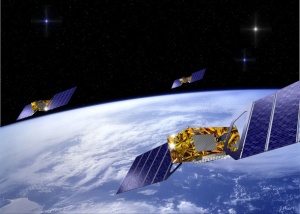With the Galileo constellation rapidly taking shape, the European Union has opened lines of communication with countries in North Africa and the Middle East with a view to assisting their governments and businesses to use the satellite services that extend across the Mediterranean. The services available to countries will be Galileo and EGNOS. The EGNOS system corrects typical GNSS errors such as the ionosphere disturbing the signal and slight discrepancies between the clocks to provide highly accurate positioning data and integrity information.
As part of the MEDUSA (MEDiterranean follow-Up for EGNOS Adoption) project, the potential of these services are being explained in a series of actions, aimed at awareness, capacity building and technological transfer. Countries included in this part of the scheme belong to the so-called “Euromed” region: Algeria, Egypt, Israel, Jordan, Lebanon, Libya, Morocco, Palestine, Syria and Tunisia.
Antonella Di Fazio from Telespazio which is leading the MEDUSA project said: “We are working with each government to assist them in the implementation of their individual action plan according to their priorities. We are also offering technical expertise to give countries the tools to create the bases for an optimal adoption of E-GNSS. Most countries’ priority is civil aviation and the approaches to airports. After that they are looking at logistics and intermodal freight transport.”
As the Galileo constellation is still being assembled, EGNOS services are today partly available on the Mediterranean shores of North Africa, and Euromed countries can already prove and use them.
MEDUSA aims to build capacity, transfer technical knowledge and create incubator clusters with early adopters in various domains using common initiatives. As part of the technical assistance programme, MEDUSA operates the Galileo EuroMed Cooperation Office (GEMCO), a cooperation structure located in Tunis, to act as a point of reference for the Euromed countries concerning E-GNSS. GEMCO promotes awareness, organises workshops, facilitates links between Euromed-based stakeholders and the EU, fosters E-GNSS related stakeholder initiatives and provides assistance to ensure the participation of all Euromed countries.
Euromed countries are very interested in learning how to benefit from EGNOS and on the next move to ensure a complete EGNOS service coverage across their region.

